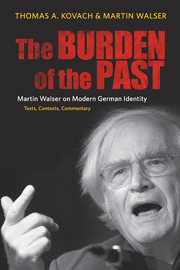Book contents
- Frontmatter
- Contents
- Acknowledgments
- The Burden of the Past
- Introduction
- Our Auschwitz (1965)
- No End to Auschwitz (1979)
- Handshake with Ghosts (1979)
- Speaking of Germany (A Report) (1988)
- Experiences while Composing a Sunday Speech: The Peace Prize Speech (1998)
- On Talking to Yourself: A Flagrant Attempt (2000)
- Conclusion
- Suggestions for Further Reading
- Index
Speaking of Germany (A Report) (1988)
Published online by Cambridge University Press: 05 February 2013
- Frontmatter
- Contents
- Acknowledgments
- The Burden of the Past
- Introduction
- Our Auschwitz (1965)
- No End to Auschwitz (1979)
- Handshake with Ghosts (1979)
- Speaking of Germany (A Report) (1988)
- Experiences while Composing a Sunday Speech: The Peace Prize Speech (1998)
- On Talking to Yourself: A Flagrant Attempt (2000)
- Conclusion
- Suggestions for Further Reading
- Index
Summary
Context
THE SPEECH THAT FOLLOWS was delivered at the Kammerspiele Theater in Munich on October 30, 1988, as part of a series called “Redenüber unser Land,” or “Speeches about Our Country.” Though he was not involved in any major controversies in the 1980s, Walser's reputation as a writer who had abandoned his older left-wing convictions in favor of right-leaning nationalist sentiments had established itself among most of his former left-wing colleagues, in spite of the fact that during these years he signed at least one pro-labor petition and spoke enthusiastically about the success of the Green Party in gaining seats in the German Parliament. Still, this “reclassification” was not the material of newspaper headlines or TV news reports and thus did not penetrate into the general public, which continued to purchase and read his novels. This 1988 speech, however, was to provoke a significant public controversy.
In the speech, Walser refers to what was undoubtedly the most significant controversy in West Germany during the 1980s, the so-called “Historikerstreit” or Historians' Debate. This had begun with an article by the conservative historian Ernst Nolte in the FAZ, in which he argued that the Holocaust was a response to the class-based mass murders of Stalin's Soviet regime; he thus rejected the notion of the Holocaust as a unique event and suggested that it was essentially a defensive reaction by a German state that felt threatened.
- Type
- Chapter
- Information
- The Burden of the PastMartin Walser on Modern German Identity: Texts, Contexts, Commentary, pp. 55 - 80Publisher: Boydell & BrewerPrint publication year: 2008



